Motorhomes Versus Fifth Wheels: What’s Behind the Choice?
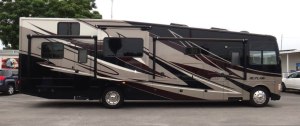
2015 Thor Outlaw 37LS Motorhome
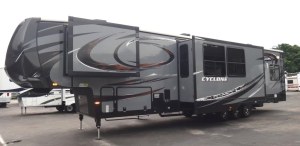
Heartland Cyclone 4200 Fifth Wheel
By Valerie Coffey
With our experience of having stayed in well over a hundred RV parks and having met numerous owners in the past two years, we know that the most common choice of RV for people who plan frequent use or full-time travel is often either a fifth wheel or a motorhome. (Read my previous post for the definition of various RV classes, What Type of RV Should You Choose?)
Why do some people choose motorcoaches and some choose fifth wheels?
Evaluate Your Needs
When Mitch and I began planning our life as full-time RV travelers in the U.S., we knew we would be selling our home, and planned to move “Someplace “Warmer and Cheaper Than Massachusetts” — at least, that was one of our main goals. (Read more about that here.) So our RV would be our only home for the next year, or as it turns out, two or more, who knows? So a comfortable living space was a big deal to us.
We had an ambitious itinerary, and we loved the idea that we wanted to drive our home with the convenience of not stopping for lunch or bathroom breaks (for the passenger anyway). It would be just the two of us, with friends and family staying with us occasionally for a few nights. We would take minimal belongings (read: as much as we could fit), including ski equipment, gravity loungers, camping equipment, a grill, tools, office equipment, so plenty of storage and an engine powerful enough to get us over major mountain passes was important.
We would be continuing our careers and working from our new RV home, so work space was a consideration. I’m a science writer, and Mitch is on the phone a lot as a consultant to early-stage IT companies, so spaces where we could work comfortably and separately mattered.
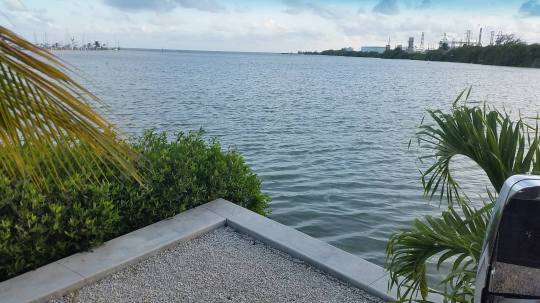
The view from the driver’s seat mattered to us. This is our spot in Key West — from our motorhome passenger compartment.
A dream of a motorhome had a powerful pull on us both. I wondered, why do so many RV owners have such a devotion to their choice of motorhome versus a fifth wheel? Since I research and write science and technology articles for a living, it was not a stretch to research the reasons people choose motorhomes versus 5ers. They are as varied as the people who own them. Here are some of the pros and cons between the two.
Budget
The first and biggest consideration between fifth wheels and motorhomes and is often price and how much you can afford. Fivers are more affordable on average than motorhomes.
Fifth wheels buy you the maximum square footage per dollar. While the entry-level price for a new travel trailer (TT) is around US$20,000 MSRP, that would get you a small model that wouldn’t stand up to full-time use. Higher quality fifth wheels with a living space footprint up to the maximum allowable 430 square feet with all slides fully extended can range up to $275,000 MSRP or more, new.1,2
Add to that the cost of the heavy-duty truck required to pull it, starting new at around $40,000 MSRP, a new 5er with a roomy floorplan could cost $300,000 or more.
But if you already own a heavy-duty pick-up truck (a truck for towing heavy loads; e.g., a 2016 Dodge Ram 3500 is rated to pull up to 31,200 lb), the relatively low entry cost and ample square footage of a 5er is attractive.

Mirrors on the ceiling…The luxury 2014 Prevost H3 45-foot Liberty motorcoach is on the high end of used RVs. Price not posted (www.prevost-stuff.com).
In comparison, new motorhomes of the same size (430 sq. ft.) start at $150,000 MSRP on the low end, while high-end luxury coaches can cost up to $2 million. Most full-timers also decide to tow a vehicle (called a “toad”) for exploration once the RV is set up. But like the cost of a truck, the cost of a toad is often unimportant in the overall decision to those considering a motorhome because most people already own a vehicle (albeit perhaps not a towable one).
Truck v. Car
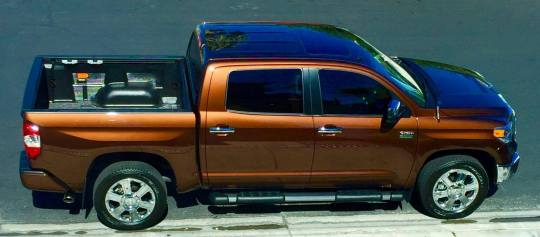
An unloaded Toyota Tundra may only get 8 mpg, the same as our 45-foot motorhome fully loaded plus the toad.
Gas economy enters into the equation for us. Our friend Dawn has a 2014 Toyota Tundra Limited Edition 1794 extended-cab, 4WD pick-up truck. Toyota claims it averages up to 13 mpg city. Dawn (a self-professed lead foot) claims to average 8 mpg – not towing anything.
Our 40,000-lb loaded motorhome gets 7 to 9 mpg also, when towing our car and all our belongings! It averages a bit less going over mountain passes against the wind, but all things considered, that’s pretty good gas mileage for a HOUSE!
When we stop for a few days, our diesel-hungry house stays parked. We use the coach as our home base and explore a region using a more fuel-efficient vehicle. We use a 2014 Hyundai Veloster, a standard shift that averages 30 mpg or more. To date, we’ve put 26,000 miles on our toad, compared to 31,000 miles on the coach. That’s a lot of gas savings. And obviously, our tiny toad is a lot easier to park than a heavy-duty pick-up!

Me and my toad: the Hyundai Veloster (or Val-oster as we call it) does fine off road, like on the 17-mile dirt road winding through Monument Valley in Arizona.
You’ll see plenty of motorhomes in the U.S. towing Jeeps for off-road exploration. We weren’t into “muddin’” or 4-wheeling in the wild when we left Massachusetts. You can’t just go off-roading out east like you can out west. It’s too thickly settled.
But once we got out west and took a couple of trips by Jeep (a Pink Jeep tour and a rental), we “got it.” That said, you should see the stuff we’ve taken the tiny Veloster on! The Navajo Jeep tour guides in Arizona laughed at us when we said we were considering driving our car on the 17-mile tour of Monument Valley’s back roads. But we did it anyway, slo-o-o-wly, and had no problems except for a lot of red dust. We did bottom out another time, on the Valley of the Gods Scenic Drive on the Utah/Arizona border, a road that was rated as “well graded.” Thank goodness for plastic undercoating!
Space and Layout
Mitch and I have enjoyed spending time together like two peas in a relatively small pod, but finding an RV with the layout we wanted took many months of research, poring over online listings and visiting RV shows. I wanted devoted work space to set up a second computer monitor, while Mitch can work with his laptop and phone anywhere you put him. At first he suggested we use the small kitchen table for our work space, but I didn’t want to have to put away our office every time we wanted to eat at home.
Turns out we didn’t feel too badly about sacrificing a pull-out loveseat sofa and the sleep space it would provide for a dedicated work station. But we had to buy a new RV instead of a used one, because we couldn’t find used models with the layout and dedicated work space we wanted. This considerably raised our price point (read our post on whether to buy a new or used RV). I now have a dedicated work station, but it was very difficult to find along with all the other things we wanted.

Inside our Tuscany motorcoach, the 2014 45LT layout has a permanent work station on the right instead of a pull-out loveseat sofa.
For our situation, our Thor Tuscany 45LT (the 45 in this case reflects the length of 45 feet) all-electric diesel pusher coach is perfect for us and we wouldn’t trade it for anything. We love having 1.5 bathrooms! (Two toilets for two people is a luxury, but it’s crucial when we have visitors). We have a full-size residential fridge, dishwasher, stacked washer-dryer for laundry, and a full closet for hanging clothing.
One thing 5ers offer more often than coaches is a large kitchen with a central island. That extra counter space is really nice to have. Fifth wheels can also offer ceilings with a few more inches in height. But 5ers are designed to collapse into an unlivable space when it’s on the road. That kitchen island blocks the middle of the trailer when the slides are in. Riders must ride in the truck or SUV that tows the trailer. You can’t ride in a trailer, legally, nor can you practically ride in a 5er, because you would have no room to sit or move around. In most 5ers, the slides meet in the middle when pulled in for travel. If you don’t want to stop for food, you can pack a lunch or bring a cooler with food into the truck or SUV with you.
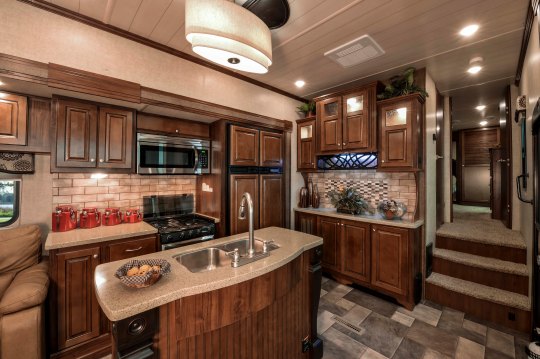
Is this a nice residential home or an RV? The 2016 Heartland fifth wheel has an Oakmont kitchen with a central island. Few motorcoaches offer such a central island.
Coaches are designed so that the aisle is passable from the riding area to the kitchen and bathroom. Passengers can sit on the couch with a seat belt and watch a movie while the RV is underway. Passengers can also get up briefly to use the bathroom and reach the kitchen.
Coaches often feature cushy, padded, luxury bucket seats in the front for driver and passenger. The comfort of those seats helps on long drives. The passenger seat reclines, and has a retractable footrest. Luxury! Upon landing at your site, those seats release with a lever and turn around to become part of your living room.
Having your dashboard, driving controls, and steering wheel in your living room takes up space in a coach, whereas a TT can make use of that (often expansive) dashboard space for more living space. In our coach, we use the space behind the bucket seats and under the dashboard for our shoes and storage when we’re parked.
Storage
A 5er and standard motorhome of the same length will have comparable storage space. You might even see pantries and walk-in closets! But the 45’ Class A buses have some of the biggest storage areas available in the RV world. The extra storage is in the space underneath your feet, called the basement, which is accessible from outdoor compartment doors, some with slide-out trays to make your stored items easily accessible.

Coaches like our Tuscany have two pass-through storage compartments underneath the living space, accessible through exterior doors. A pull-out tray on the larger compartment makes stored items more accessible.
Set-Up
One disadvantage of trailers is that many people consider it more of a chore to tow and set up a fifth wheel, compared to simply driving a motorhome. A coach towing a vehicle with four wheels down can be unhooked by one person in short order, while the truck towing a trailer takes a bit longer (Read eHow’s How to Unhook Your Fifth Wheel). Both types of RVs require set-up, but one way I’ve heard it put is that a motorhome owner with automatic leveling jacks (which most have standard) will likely be sitting and enjoying a drink at the campsite long before the travel trailer owner will. Newer fifth wheels, however, have introduced improvements that diminish this difference.
That reputation has led to a myth that motorhomes are for full-timers who move frequently, whereas 5ers are for people who move infrequently. That’s simply not true, as many full-time 5th wheel owners can attest. You can be a full-timer in a 5th wheel and move frequently; it’s very much a matter of personal preference. But if your goal is to drive straight south and stay parked for the winter, as opposed to touring around the country, a 5th wheel would make better sense economically.
One advantage of motorhomes is that when you arrive at your destination, the inside is already cooled/warmed if it’s very hot or cold out. Or at least it can be. When traveling as a couple, the back of the coach often gets too hold or cold for comfort – they’re drafty on the road. If we have someone traveling with us in back, we can turn on the generator while we travel to keep the back comfortable if necessary.
On the other hand, a 5er must be brought to a comfortable temperature once you’re set up, which takes time.
Parking
Parking in a back-in campsite with a 45-foot TT is arguably trickier than backing up a 45-foot coach. With the truck attached, the total length of a TT/truck combo is longer (maybe 55 feet), and it pivots at the tow attachment. A coach is all one piece, as you must unhook the toad from a coach before backing up – the tow bars are not designed to go in reverse. Having a pivot complicates the back-in process for a 5er, but also allows a bit more room for maneuverability in and out of tight spaces. Parking of either type of RV is something you get better at with practice.
I actually enjoy parking the Tuscany. I often get thumbs up, cheers, and comments from impressed onlookers when I back-in the 45’ Tuscany, which is very flattering, but you know…it’s often just because you don’t see these behemoths parking every day. Also, in spite of the fact that it’s the 21st century, you especially don’t see too many young (working age) women parking them. The truth is, back-up cameras, walkie talkies, and a good outside director – in my case, Mitch – make it much easier.
Speaking of parking, a motorhome gives you the ability to pull over and sleep, eat, whatever, without ever exiting the coach at rest stops – a definite boon in poor weather.
Reliability
The more complex the unit, the more complex the maintenance and issues you’re likely to have. Both motorcoaches and 5th wheels both have furniture, plumbing, HVAC systems, kitchen appliances, TVs, water-heating systems, generators, and electrical systems. That’s a lot of stuff to go wrong in either case. But motorhomes introduce a big-rig engine, transmission, more tires, and all that those systems entail.
When our motorhome broke down on day 5 of our year-long adventure (a must-read story for future motorhome owners), we had to be towed, and that entailed removing the drive shaft on our brand new coach. It was incredibly stressful and disappointing, but luckily, towing and repair was covered under the manufacturer’s warranty.
If you are a detail-oriented, Type A person, like Mitch (he owns it), you’ll do well with the spreadsheets required to track the problems of and service appointments for a new motorhome or 5th wheel – and I say that with a small inside smirk – but ask any owner of a new RV. It’s true. You will have problems. Mitch has a master’s degree in electrical engineering, so an all-electric coach was right up his alley. Others might not be as comfortable with that choice (like me, if I were traveling alone).
All smirking aside, one of the advantages of 5ers is you only have one motor and chassis to take care of – the pick-up truck. The pick-up becomes your separate vehicle once your RV is parked, leveled, and all set up. A fifth wheel or TT doesn’t have an odometer, so you can tow it tens of thousands of miles and it won’t depreciate based on that mileage, just on the year of manufacture and its condition. So generally, a motorhome depreciates faster than a 5er.
With a motorhome, you typically have to take care of two motors – the RV and the toad. The motorcoach has an odometer, which reveals a lot about your usage when you go to sell it. Keep in mind, diesel vehicles such as trucks and coaches that cost more upfront but depreciate at a slower rate than ones with gas engines. According to a 2013 study by the University of Michigan, diesel cars and trucks held more of their value on average after five years/75,000 miles than gasoline vehicles, but the percentages depend on the type and condition of the vehicle. The recent drop in diesel fuel prices have made it a more economical choice than gas for the time being.
Resale Values
Industry estimates of depreciation vary. According to some estimates, new RVs regardless of the type depreciate roughly 10 to 18 percent in the first year of ownership (assuming a good discount on the MSRP, not including sales tax or fees).3 Depreciation rate drops off in subsequent years (some estimates say to 10 percent in year two, 7 percent in year three).
RVers Online chief technical editor Bob Gummersall estimates in a post on RVersonline.org that after five years of ownership, an RV is worth about half of its net purchase price (more or less depending on the MSRP discount from 15 to 25 percent).
In comparison, Randall Eaton of the Motorhome Comparison Guide estimates that in five years, most RVs will depreciate 45 to 55 percent from their original MSRP.
Either way, the message is again to buy used for the best value, but obviously the risk to a buyer is the unknown. You don’t know exactly what a used unit has been through or what its current condition is. An owner of a used RV should keep complete maintenance records and share them with prospective buyers. You can request the seller provide a Carfax report to reveal work done by authorized dealers. And a buyer should have a full inspection performed by a reputable RV service center to understand any issues, recalls, or problems with the unit.
Whether you’re buying new or used, consider an extended warranty. We highly recommend working with Wholesale Warranties. They will discuss with you the pros and cons of extended warranties beyond what your manufacturer or dealer offers, and collect quotes from numerous insurers for you to compare.
Viewpoint
One benefit we gain from touring in a motorcoach is that your view is from on high! See the above video, in which you see a view over the guardrail from our coach when passing by Hoover Dam. You won’t see anything but guardrail in a pick-up. Motorhomes have huge, wide-open windshields! In a coach like our Thor Tuscany, you’re seated a good five feet higher than you sit in a pick-up truck. The visibility over guardrails and around other cars is the best – you’re at the same level as most big-rig trucks. What a great way to really *see* the country!
Perhaps the loyalty that people have for their choice of RV comes from having made a huge personal decision, and needing to justify it? Whatever RV you choose, no answer is right or wrong. It just has to be the right answer for YOU!
—
Notes
- Prices gathered from www.rvtrader.com and www.americachoicerv.com.
- New Horizons’ Majestic RV review, Trailer Life (2015).
- R. Eaton, Motorhome Comparison Guide 2006 – 2014, JR Consumer Resources, Clarkston, WA (2014).
Other useful articles:
RVers CHOICE: MOTORHOME OR TRAILER? From http://www.rversonine.org
What’s Better: A Motorhome or Trailer? From http://www.reserveamerica.com
Motorhome Vs Fifth Wheel: RV-Dreams Forum
—
We love hearing your comments! So leave us a note! Tell us what you love the most about your motorhome or fifth wheel. What are your primary considerations in your choice of RV?

cbastian2013
We would love to have a coach. The set up time of our 5th wheel is something that bothers me the most.
We have a 40feet Open Range Rolling Thunder. Which is officially toy hauler. It has a small room in the back a bit wider than a queen bed. It has 2 doors, one on each side that are ramps. It also has a patio on one of the slide outs on the side. Once the slide is out you than lower down the platform and place the railing. It’s big enough for a camping table, 2 chairs, a cat house:-), my tomato and strawberry plants and we have flower planters on the railing plus a large awing. The room at the back has sliding doors from the living area, a hydraulic queen size bed, a desk under the large black out windows, we installed the desk ourselves around on the walls are cabinets.
We first started looking we wanted a coach, we looked at all plans are storage area but none fitted our requirements. I’m disabled and have an electric wheelchair. The one we take with us has off the road wheels etc so I can go places. The one I use indoor in our stick home is smaller. But there was no way that we could fit the wheelchair in a coach, making a coach adjustable was a large sum of money and I would need a smaller size wheelchair. I need the wheelchair indoors when it is a home and the distance I would need to walk would be to far. In the 5thwheel I can shuffle around a few steps holding on to carefully placed railings. The patio is a god send for me. I can sit out and don’t have to go up and down the stairs. Plus it’s ideal for the dogs and cat and it is a great conversation starter. 🙂
When we’re on the road the chair goes into the back room, when we are parked I park the wheelchair under the overhang at the front. The back room is used by my husband as an office and he also use it as a bed room. I know it’s shocking to a lot of people that we sleep apart but my condition is a very painful one and I can be tossing and turning all night or be up and reading keeping him awake. So having separate sleeping areas was also on our list. He didn’t look forward to having to pull out a couch every night and this floor plan fitted us very well. The hydraulic queen bed is very comfy and he loves the view at night through the roof window and the large window at the back.
The only negative is parking and setting up. I’m of no use when he needs to back in so he has to do it all by himself. Which sometimes can take a while. Than when it is parked he needs to do all those things such as leveling etc. he tries to get the slides out as quickly as possible so I can go in, but so times I just sit and wait in the truck for an hour. It certainly influences us how long we will stay somewhere. I would love to have a coach and pack up the next day and move on. The work it takes to get everything ready again for leaving often makes us stay longer than we wanted to.
I wish we could find a solution for having a coach. Some said buy a small trailer to pull the wheelchair as a toad but than we would have no car to drive around.we also would love to have a bit smaller RV, when we purchased ours we had no idea that we would not fit into most state parks. We miss out on a lot of gorgeous parks just because we’re too big. We would live a 33-35 feet. Another thing is that when the weather is bad, storm and rain we need to put up the patio to make sure no water will be leaking into the sliding doors. Whe you put the patio up it will be dark inside because we lost the light of the big sliding doors. Those would be extreme conditions but we did have them parking in the fall/winter at the Oregon coast.
Well this has become a novel. Hope it didn’t bore you to death 🙂
My Instagram feed has some pics @pnwdutchgrl
— Christine
LikeLiked by 1 person
T.Mac
Newmar has the Canyon Star wheelchair accessible coach with lift…. but it’s pricey!
LikeLike
Ramiesontheroad
Gorgeous rig! We were right place, right time finding ours – the 5th wheel truck/rig combination is such a headache!
LikeLiked by 1 person
C'est La Vie Three
One thing that was a huge factor for us was the safety concern for the younger passengers. Motorhomes only have the 2 front seats that are safety rated, therefore the couches and dinettes aren’t as safe as the average car seat. We decided it was safest as a young family to keep driving and towing. We may upgrade to a motorhome when it’s just the two of us, because the front window while driving is breathtaking!
LikeLiked by 1 person
RVLuckyOrWhat
Right! Great point! The cab seating in a truck or SUV towing a fiver is safer than the seating in the back of a coach. That could be a major consideration for families with young passengers.
LikeLike